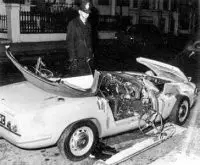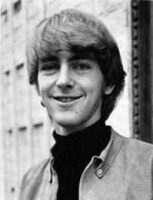The 21-year-old socialite Tara Browne, a friend to The Beatles and an heir to the Guinness empire, died on this day in a traffic accident. A report detailing the coroner’s verdict into his death inspired John Lennon when writing ‘A Day In The Life’.
Browne was a member of the Irish aristocratic family Oranmore & Browne, and was a member of the Swinging London scene in the mid 1960s. He was the son of Dominick Browne, the fourth Baron Oranmore and Browne, and Oonagh Guinness, heiress to the Guinness fortune.
Browne was in line to inherit a £1m fortune upon his 25th birthday, and died leaving the considerable sum of £56,069 in his estate.
On the night of 17 December 1966 he and his girlfriend, 19-year-old model Suki Potier, had spent the evening at a friend’s house in Earls Court. They left shortly before 1am on the following morning, in search of food.
Browne drove his Lotus Elan car through London’s South Kensington at high speed. He failed to notice a red traffic light and drove through the junction of Redcliffe Square and Redcliffe Gardens, colliding with a stationary van in Redcliffe Gardens after swerving to avoid an oncoming Volkswagen car.
Tara Browne died of his injuries the following day, and was survived by his wife Noreen, from whom he had separated, and their two sons. Potier later claimed that Browne swerved the car to absorb the impact of the crash to save her life. She was unharmed in the accident.
On 17 January 1967 John Lennon was writing ‘A Day In The Life’ while reading a copy of that day’s Daily Mail newspaper. A brief news item reporting the coroner’s verdict into Browne’s death inspired the opening lines of the song.
I was writing ‘A Day In The Life’ with the Daily Mail propped in front of me on the piano. I had it open at their News in Brief, or Far and Near, whatever they call it. I noticed two stories. One was about the Guinness heir who killed himself in a car. That was the main headline story. He died in London in a car crash.
Anthology
In Hunter Davies’ 1968 authorised biography of The Beatles, Lennon explained how the words of the song were indirectly inspired by the events.
I didn’t copy the accident. Tara didn’t blow his mind out. But it was in my mind when I was writing that verse.
The Beatles, Hunter Davies
In his 1997 authorised biography Many Years From Now, Paul McCartney downplayed suggestions that the song was directly about Browne’s death.
The verse about the politician blowing his mind out in a car we wrote together. It has been attributed to Tara Browne, the Guinness heir, which I don’t believe is the case, certainly as were were writing it, I was not attributing it to Tara in my head. In John’s head it might have been. In my head I was imagining a politician bombed out on drugs who’d stopped at some traffic lights and didn’t notice that the lights had changed. The ‘blew his mind’ was purely a drugs reference, nothing to do with a car crash.
Many Years From Now, Barry Miles



Why does Paul consistently have a completely alternate version to every Lennon story? Mind you I admire the man to pieces and frankly am envious of his many accomplishments. Don’t get me started on his near permanent good looks. I just don’t understand the perpendicularity of his accounts? It’s like he lives in an alternate universe.
Memory works in strange ways.
Esp. If you’re speaking as a third person..
I agree, John is no longer here.( Paul seems to stay relatively Paul by disagreeing with John’s account.)
The reason for Paul McCartney’s versions of things–especially when it comes to songwriting–started to show up after December 1980, and can be found in everything from his concert programs to interviews, and especially in the official “biography”/autobiography Many Years From Now. While John’s and Paul’s verses for “A Day in the Life” originally were composed independently, with John seeing the usefulness of Paul’s youthful remembrance of waking and going to school or work on a bus, Paul noticeably speaks of “we” and “I” when talking about John’s verses, which of course were sung by John. It’s as if he wants credit for John’s verses (“In my head I was imagining…”), as well as his own. Biographer Philip Norman, author of ‘Shout: the Beatles in Their Generation,’ said to the CBS West 57th program, when speaking of George Harrison, that after losing John, George would be the person to go to about the Beatles’ story, “because McCartney won’t tell you. He re-writes history, all the time.” (See youtube.com/watch?v=zFhJeCY5R3w)
I’d put Paul’s alternate memories down to John’s inflated drug use. What’s the new Mary Jane indeed.
I don’t like the way McCartney tries to change things. If the line was about drugs then the rest of the line makes no sense. I think it’s Macca’s way of avoiding a controversial lyric. Also I would imagine Lennon wrote his own singing lines by that stage. I even heard Macca trying to take some credit for The Benefit of Mr Kite recently.
Well, there was always a level of collaboration, even if it was very minuscule.
I thnk like Julian. In almost all songs by Lennon/McCartney we must expect both were present, even if in a minuscule way. One that made me really surprised was “Tomorrow Never Knows”, which seems so Lennon, but now we know Paul contributed a lot with those sounds.
he was a friend of theirs. He was driving Paul’s car. Of course it was about him.. It was personal and they probably didn’t want to talk about it.
Besides, in the “Free as a bird” video, we can clearly see the damaged car after the accident, The Beatles looking and walking around.
A lot of their songs have conflicting stories. John doesn’t mention that they knew Browne, and Paul contradicts himself throughout the years. The article doesn’t really make much clear either probably due to this.
From what understand Paul drove a green Aston Martin. Besides ”A Day In The Life” being connected to Tara Browne the song ”Baby, You’re A Rich Man” can also be referring to Browne: ”How does it feel to be/ One of the beautiful people’ Chorus- ”You keep all your money in a big brown bag/Inside a zoo. What a thing to do. Baby, you’re a rich man.”